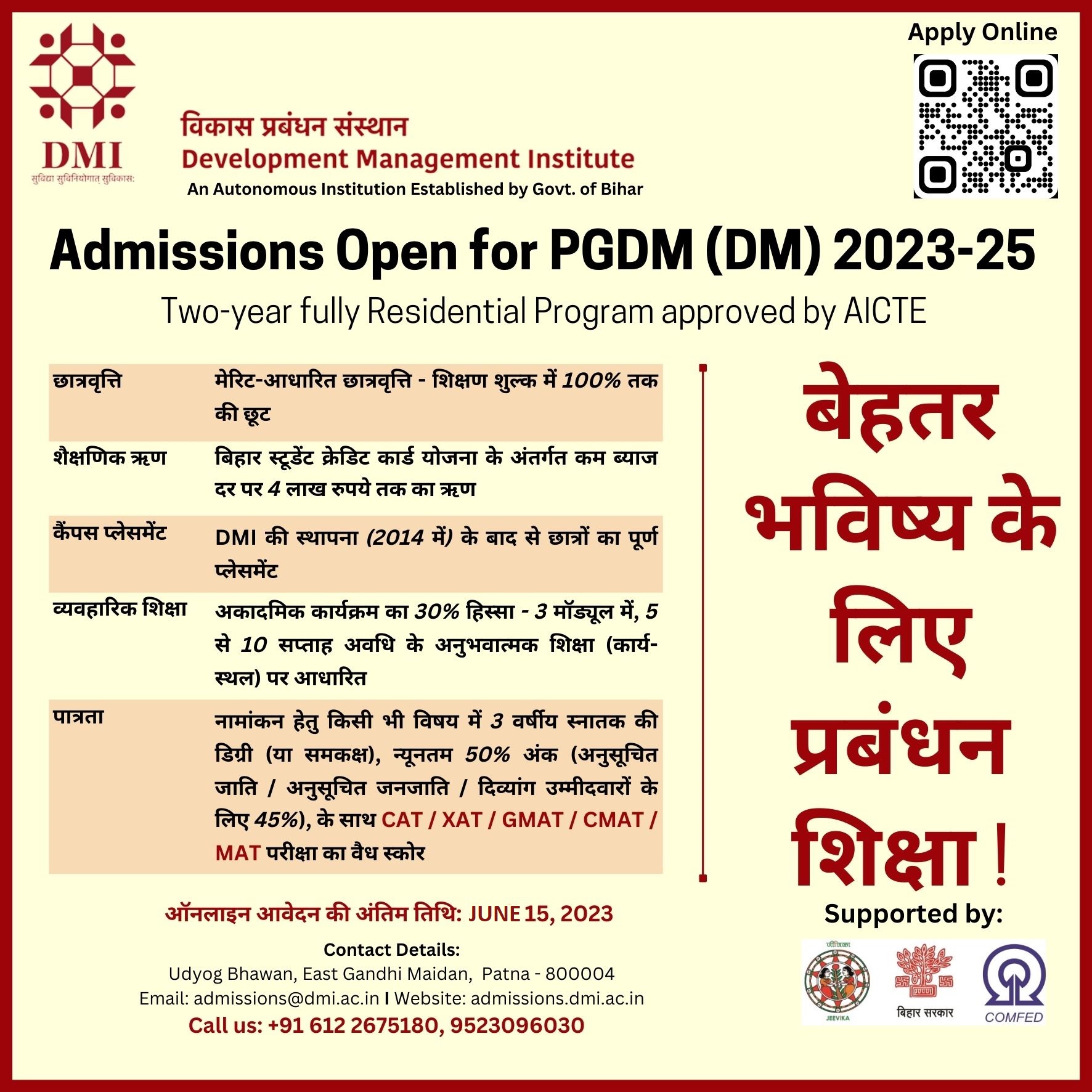2023
Evaluation of Centralized Kitchens run by NGOs for PM-POSHAN Scheme in Bihar
The Context
In Bihar, the PM-POSHAN scheme started running with full force after the formation of Bihar Rajya Madhyan Bhojan Yojana Samiti (BRMBYS) in 2008. Along with the arrangements to cook and serve mid-day meals in schools, the concept of a Centralized Kitchen was initiated to provide cooked food to schools through a centralized kitchen managed by Non-Government Organizations (NGOs). Currently, 12 NGOs are working to provide hot mid-day meals to schools located in 27 districts of Bihar. The program caters to several schools across the state of Bihar. Therefore, it becomes essential to comprehensively evaluate the centralized kitchen that cooks and supplies MDM to schools in the state. At the request of the BRMBYS, a comprehensive evaluation was undertaken to assess the performance of centralized kitchens run by NGOs.
Assessment of the effect of COVID-19 led lockdown on migrant workers and their families in Bihar and Uttar Pradesh: A follow-up study
The Context
As migration seems inevitable against the backdrop of more pronounced uncertainty and chaos due to the current pandemic scenario, the risks faced by many migrants and their families have been made more visible by this crisis. In this context, the focus on the capacity to avoid and escape poverty by the migrants was of interest to recognize the 'resilience’ of migrant workers and their families. Against this backdrop, this study involved a follow-up assessment to trace the lives and livelihoods of migrant workers and their families over time by going back to the same cohort of migrants surveyed during and post-lockdown phases in two 'source’ states of Bihar and Uttar Pradesh (UP) that comprise a significant proportion of internal migrants in the country. The objectives of the study were to assess the impact of displacement on migrant workers and their families.
2021
Impact of COVID-19 led Lockdown on Migrant Labourers and their Families in Uttar Pradesh: An Assessment
The Context
The uncertainty and chaos induced by COVID-19 with an extended lockdown exacerbated the situation, triggering an unexpected and unprecedented magnitude of reverse migration of migrant workers, especially from Uttar Pradesh (UP). The migrants in their desperation, took to walking back to their homes, the ‘source’ place, often hundreds of kilometers away from their present migration destinations. The sudden surge of migrants at the ‘source’ place has hit the under-resourced local government hard to accommodate the socio-economic needs of the returnees. DMI undertook a systematic assessment to understand the impact of COVID–19 on migrant laborers and their families, including underage migrants, in UP. The objectives of the study were to assess the impact of displacement on migrant workers and their families.
Impact of COVID-19 led Lockdown on Migrant Labourers and their Families in Bihar: An Assessment
The Context
The uncertainty and chaos induced by COVID-19 with an extended lockdown exacerbated the situation, triggering an unexpected and unprecedented magnitude of reverse migration of migrant workers, especially from Bihar. The migrants in their desperation, took to walking back to their homes, the ‘source’ place, often hundreds of kilometers away from their present migration destinations. The sudden surge of migrants at the ‘source’ place has hit the under-resourced local government hard to accommodate the socio-economic needs of the returnees. DMI undertook a systematic assessment to understand the impact of COVID–19 on migrant laborers and their families, including underage migrants, in Bihar. The objectives of the study were to assess the impact of displacement on migrant workers and their families.
Integrated Development of Eight Villages in Bihar: End Term Evaluation
The Context
This study was to do an end-term evaluation of outputs and outcomes achieved through “Integrated Development of Eight Villages in Bihar” under the AKRSP (I) and John Deere sponsored Project. The primary objective of the evaluation is to review the progress and performance against planned objectives, outputs, and outcomes under Multi Input Area Development (MIAD) approach. The MIAD approach places central importance to the community mobilization.
2020
A Qualitative Assessment of Impact of COVID- 19 on Migrant Labourers and their Families in Uttar Pradesh
The Context
In Bihar, the PM-POSHAN scheme started running with full force after the formation of Bihar Rajya Madhyan Bhojan Yojana Samiti (BRMBYS) in 2008. Along with the arrangements to cook and serve mid-day meals in schools, the concept of a Centralized Kitchen was initiated to provide cooked food to schools through a centralized kitchen managed by Non-Government Organizations (NGOs). Currently, 12 NGOs are working to provide hot mid-day meals to schools located in 27 districts of Bihar. The program caters to several schools across the state of Bihar. Therefore, it becomes essential to comprehensively evaluate the centralized kitchen that cooks and supplies MDM to schools in the state. At the request of the BRMBYS, a comprehensive evaluation was undertaken to assess the performance of centralized kitchens run by NGOs.The sudden ‘lockdown’ on 24th March 2020 due to the COVID–19 pandemic across India triggered panic, particularly among millions of migrant workers, who suddenly found themselves without jobs or a source of income. The suspension of all transportation further aggravated their difficult situation, and men, women, and children were forced to take an arduous journey back home from the ‘destination’ to their ‘source’ states by making their own arrangements. The panic exacerbated the situation in the major source states of Uttar Pradesh (UP) into a full-blown humanitarian crisis as migrants, in their desperation, took to walking back to their homes. DMI undertook a rapid assessment to understand the impact of COVID–19 on children, migrant workers and families in UP. The objectives of the study were to assess the impact of displacement on migrant workers and their families.
A Qualitative Assessment of Impact of COVID- 19 on Migrant Labourers and their Families in Bihar
The Context
The sudden ‘lockdown’ on 24th March 2020 due to the COVID–19 pandemic across India triggered panic, particularly among millions of migrant workers, who suddenly found themselves without jobs or a source of income. The suspension of all transportation further aggravated their difficult situation, and men, women, and children were forced to take an arduous journey back home from the ‘destination’ to their ‘source’ states by making their own arrangements. The panic exacerbated the situation in the major source states of Bihar into a full-blown humanitarian crisis as migrants, in their desperation, took to walking back to their homes. DMI undertook a rapid assessment to understand the impact of COVID–19 on children, migrant workers and families in Bihar. The objectives of the study were to assess the impact of displacement on migrant workers and their families.
2019
Comparative Study of Criteria for Urban Local Body Classification
The Context
Bihar ranked as the second least urbanized state with an urban population of 11.3 percent among the 35 states and Union Territories of India. This is in contrast to the unprecedented double digit economic growth that the state has witnessed in the recent decade, 2001-2011. It is, thus, a concern for urban policy analysts over the actual size of India's urban population. Further, this mismatch may lead to a host of problems, namely, from misallocation of resources to unsafe and unplanned development of densely populated clusters. It is imperative that the issues related to setting the criteria for classifying urban local bodies are addressed by the states so that the inequality in the rural-urban percentages are lowered if not mitigated. The objective of the study was to understand the comparative criteria and practices followed by major states of India in classifying the habitats as urban.
2018
Pathways to Transform: End-term evaluation of “Integrated Development of Three Villages in Bihar”
The Context
The Aga Khan Rural Support Programme India (AKRSP (I)) in collaboration with John Deere India Pvt. Limited adopted a Multi Input Area Development (MIAD) approach to implement the project “Integrated Development of Three Villages in Bihar” in May 2015. The project had the overall objective “To provide integrated development in 2 villages of Bandra block and 1 village of Muraul block in Muzaffarpur district focusing on overarching components of Multi Input Area Development approach (MIAD), leading to the better quality of life among rural communities.” The objective of the evaluation was to review the progress and performance against planned objectives, outputs and outcomes under MIAD approach.
2017
One Decade of MGNREGA: A Participatory Assessment and Way Forward in Chhattisgarh
The Context
NIRDPR launched a Nationwide study titled, “A Decade of MGNREGA: Participatory Assessments and Way Forward”, to evaluate the decade-long implementation on agro-climatic zone basis and draw insights that can have policy implications and drawing up the way forward. The study aimed to shed light on the One Decade of MGNREGA in Chhattisgarh.
Low Uptake of MGNREGA in Bihar
The Context
Bihar, predominantly agrarian and rural, is home to 33 million poor and contributes to 13 per cent of India’s total poor. The Ministry of Rural Development (MoRD) of the Government of India (GoI) launched a self-selection and rights based employment guarantee programme, named Mahatma Gandhi National Rural Employment Guarantee Act (MGNREGA) provides 100 days of guaranteed wage employment in a financial year to every rural household whose adult members volunteer to do unskilled manual work in 2006 across India, including all the districts in Bihar. However, the MGNREGA-MIS data shows that Bihar has remained below the national average on parameters such as average days of work provided to households in a year, proportion of households completed 100 Days of wage employment, timely wage payments and women’s participation. The study set out to understand and pinpoint the causes and factors contributing to the low uptake of MGNREGA in Bihar.
2016
Effect of Prohibition on Violence against Women
Abstract
To curb alcoholism and its consequences, particularly on the violence related to women and girl child, on October 02, 2016, the Government of Bihar notified Bihar Prohibition and Excise Act, 2017 to enforce, implement and promote complete Prohibition of liquor and intoxicants in the territory of the State of Bihar and for matters connected therewith or incidental thereto by amending the Bihar Excise Act, 1915 and replacing the Bihar Prohibition Act, 1938. The study was an attempt to understand the impact of prohibition on violence against Women and Children.







